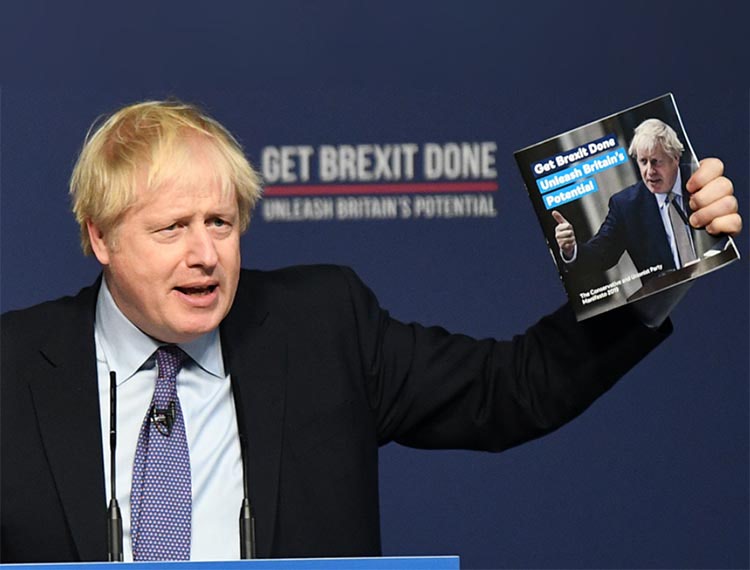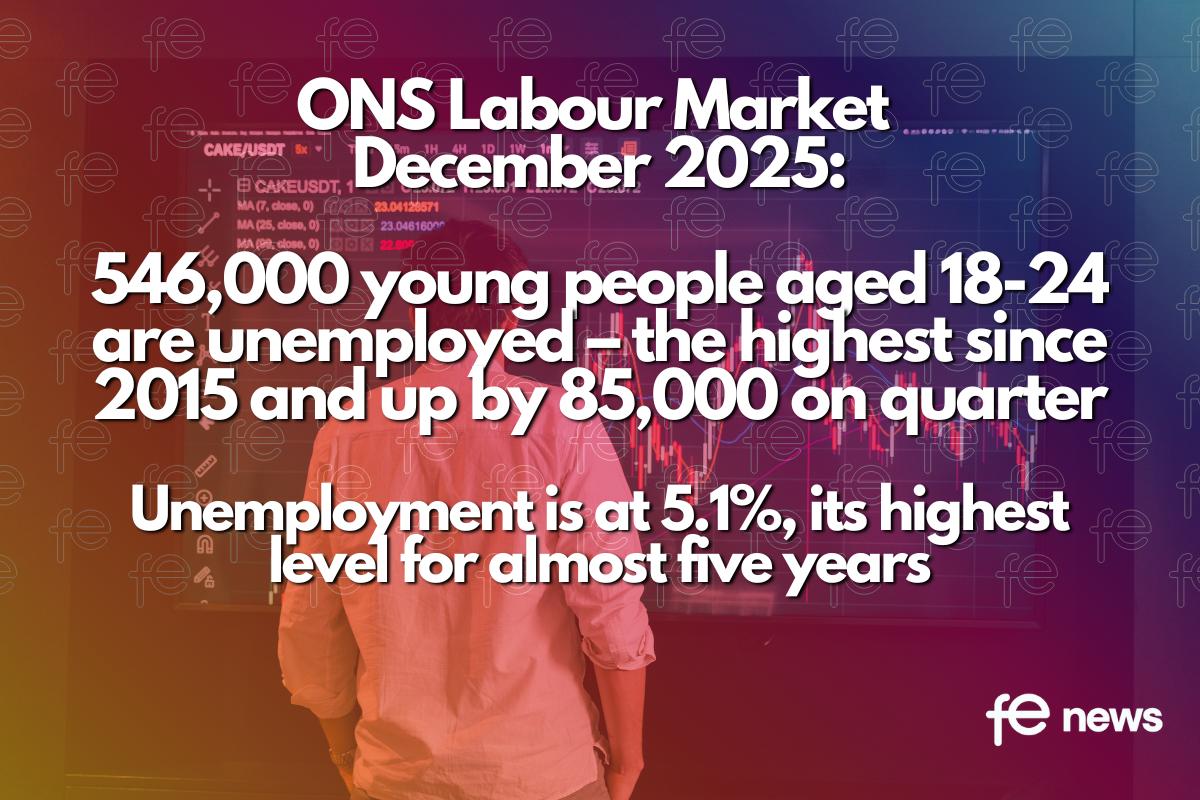£3 billion National Skills Fund Pledge and a Right to Retrain – Sector Response to Conservative Party Manifesto

Prime Minister Boris Johnson yesterday (24th Nov) launched the Conservative manifesto in Telford, entitled Get Brexit Done, Unleash Britain’s Potential.
Introducing the manifesto Boris said:
“In this manifesto there is a vision for the future of this country in which we unite and level up, with infrastructure, education and technology, and it is appropriate of course that we are here in Telford, because here more than 200 years ago, the phlegethontian fires of Coalbrookdale, created the first industrial revolution, and this whole region was a giant crucible, in which colossal quantities of hydrocarbons were burned to smelt iron and steel, and turn water into steam and power, and it is an incredible thing that here once again, in the West Midlands, a new industrial revolution is taking place, not by burning coal, not by emitting CO2, but thanks to British ingenuity we can make electrons swoosh so efficiently from anode to the cathode, or possibly vice versa, but that’s the right idea.
“That after decades of trying we can make electric cars and we can make electric buses and it won’t be long before we will be making electric or part electric planes and we in this one nation Conservative government do not want to wait to begin this future, because we believe that after three and a half years of being held back by a broken parliament it is time to unleash the potential of the whole country and to forge a new Britain and yes I am proud that we have in our national capital the greatest city on earth but I know and every survey confirms that genius, talent, ability, flair – all are distributed evenly throughout the UK
“Opportunity is not distributed evenly and I passionately believe that with education, infrastructure, technology we can tackle that unfairness, we can unleash that potential and we can make those investments.”
The manifesto sets out how a Conservative majority government would bring back the Withdrawal Agreement Bill before Christmas so that we can get Brexit done by the end of January and focus on the people’s priorities.
It also explains how a Conservative majority government that believes in a dynamic, market economy can invest in the people’s priorities like our NHS, schools and tackling crime. It includes a series of measures that will put money back in people’s pockets and help with the cost of living by reducing taxes and tackling high bills.
The manifesto has a transformative agenda of investment in infrastructure, R&D and skills training. This is essential if we are to level up the whole economy and unleash Britain’s potential.
Measures in the manifesto include:
Backing Business
Right to Retrain and a £3 billion National Skills Fund
The ambitious programme for Government will include record investments in infrastructure, science funding and skills that will help to level up the whole economy and unleash Britain’s potential:
- Take the first steps towards a Right to Retrain with a £3bn for a new National Skills Fund. This will give individuals and small businesses the chance to level-up with high-quality education and training – opening up new opportunities for the incredible talent that is spread throughout the country.
- We will establish a new National Skills Fund as the first step towards a “Right to Retrain”. We will invest £600 million a year, £3 billion over the Parliament, into the Fund. This is new funding on top of existing skills funding. We expect this to include funding for a range courses including apprenticeships. A proportion of the Fund will be reserved for further strategic investment in skills and it comes on top of existing skills and training programmes.
- We will consult widely on the design of the Fund. The Treasury will consult widely on the final design of the Fund to ensure that the money is invested wisely and delivers the best possible outcomes for individuals and businesses. The full details will be set out in the first Spending Review of a Conservative majority Government. We will have strong quality assurance mechanisms in place.
- It is our ultimate ambition to establish a Right to Retrain. Over time, it is our ambition to establish a Right to Retrain for all adults. Conservatives have previously empowered millions of people to own their own home with the Right to Buy. It is our ultimate ambition to empower millions of people in the future with the skills to achieve their potential, keep pace with technological change and embrace lifelong learning.
Education
- Every child deserves the right to an excellent education, so they are able to succeed in life. The extra £14 billion we are giving schools means at least £5,000 for each secondary school pupil and at least £4,000 for each primary school pupil. We will attract more of the brightest into teaching by raising teachers’ starting salaries to £30,000.
- A new £1bn fund for flexible, high quality wraparound childcare – available after school and outside of term time. We want to make wraparound childcare more available, giving parents the freedom, support and choice to look after their children in the way that works best for them.
- £250 million fund each year for at least three years (resource): The funding will boost both term-time wraparound and holiday provision in schools – either to create new provision or expand existing provision. The fund will also support schemes which allow charities and third sector organisations to provide holiday clubs.
- £250 million fund for year one (capital): This will be available to help schools overcome specific barriers (such as hiring staff or capital investment in equipment and premises) which might prevent them offering childcare on their site outside the normal school year, or to help underwrite the costs of new provision until it becomes established.
- It is our ambition for 250,000 more primary school children to get onsite childcare over the summer holidays. This fund will help support that ambition. That is on top of the approximately 650,000 that get it now.
- Policy is England only. Education policy is devolved. Barnett consequentials included within £1b costings.
Sector Response to the publication of the Conservative manifesto for the 2019 General Election
 Association of Employment and Learning Providers chief executive Mark Dawe says:
Association of Employment and Learning Providers chief executive Mark Dawe says:
“AELP warmly welcomes the additional funding promised for skills, because Brexit means that we need to train or retrain more home-grown talent. All three main parties appear committed to some form of skills account for individual learners which we would consider a positive step with the right to train or retrain. Equally positive would be the establishment of the £3bn National Skills Fund if it is allocated correctly to employers and learners to encourage good quality training provision.
“The Conservatives are right to aim to ‘level-up’ opportunities for small businesses. Right now, SMEs are being starved of funding to offer apprenticeships to young people across the country and the proposed Fund could actually be swallowed up in its entirety by the need to restore the funding smaller businesses used to receive for apprenticeships before the levy was introduced. But AELP looks forward to making constructive proposals on the design of the National Skills Fund.”
 Chief Executive of AoC, David Hughes said:
Chief Executive of AoC, David Hughes said:
“I welcome the Conservative Party reference to the vital role colleges play in society and to the plans to invest in the training and skills of adult. The pledge to make colleges ‘excellent places to learn’ is backed by long overdue capital investment of £2billion which will make a big impact. This attitude to colleges, skills and retraining will be vital in creating an education system that is fit for the future and which supports a more inclusive economy.
“I am worried, though, that there is no commitment to raise the funding for 16 to 18 year olds beyond the very modest increase announced in September. Neither is there mention of the sustainable investment needed across all of post-16 education and skills, including apprenticeships.
“The National Skills Fund has real potential but will not be enough on its own given the severe cuts to adult learning budgets and the pressures on funding for apprenticeships for SMEs and young people.
“Nonetheless, the Conservative Party has joined the other major parties in this election campaign in promising big increases in college investment. Colleges already support over 2.2 million people every year, but could do so much more with the increased investment promised in this election so far. If followed through, by whichever government comes to power, this is a huge step in the right direction which we are ready to support in helping to make lifelong learning and opportunities for all a reality.”
“AoC is asking all parliamentary candidates to sign up to the following five priorities:
- A new place for colleges with a streamlined regulatory regime which gives colleges a protected title that places colleges at the heart of the national infrastructure.
- Ensure no young person is left behind – colleges must be funded to offer engaging and motivating programmes for young people which also improve English and maths and address high needs.
- Commit to investment and long-term funding for colleges that strengthens institutions and develops the professional workforce
- A new lease of life for lifelong learning – that boosts opportunities for adults and apprentices across the country.
- Equal access to education and training – Maintenance support, increase in bursary fund, transport discounts, child benefit and mental health support for people from low income families.”
 Bill Watkin, Chief Executive of the Sixth Form Colleges Association said:
Bill Watkin, Chief Executive of the Sixth Form Colleges Association said:
“Although today’s manifesto does not contain a specific commitment on 16 to 18 education, the current government used September’s spending round to make the first meaningful investment in sixth form education since 2010 and we are hopeful that a future Conservative administration would build on this progress. However, we are surprised that the manifesto has not earmarked any capital funding to deal with the sharp demographic increase in sixth form students. We estimate that an additional 260,000 16 to 18 years will be participating in education by 2028, so a capital expansion fund should be a major priority for the party that wins next month’s election”.
Next government must reverse decline in construction skills: Investment and policy reform are urgently required in order to remove barriers to builders to train more apprentices
 Brian Berry, Chief Executive of the FMB, said:
Brian Berry, Chief Executive of the FMB, said:
“The construction industry must not face a ‘cliff edge’ when it comes to skilled migrant labour, if we are to meet our house building and infrastructure targets. The Conservative Party must therefore ensure that their Australian-style points-based system incorporates priority occupations and reflects the needs of businesses.”
“The industry still relies on skilled labour from the EU and will continue to do so until we encourage more young people into construction and train more of our domestic workforce. The Conservatives’ pledge to invest £3 billion in the National Skills Fund, and also in Further Education, is welcomed in order to reverse the decline in entry level apprenticeships in the sector. It’s not just a question of greater investment but also reforming the policy landscape, and we look forward to working with the next government to reform the Apprenticeship Levy to ensure it addresses skills shortages in construction.”
Ryan Shorthouse, director of the liberal conservative think tank Bright Blue, said:
“The Conservative Party is playing it safe, delivering a straightforward and focussed manifesto, rightly prioritising additional support for those on modest incomes. It is a down-to-earth manifesto, not promising an undeliverable brave new world, but a little extra help for those who often find themselves struggling.”
“This manifesto is driven overwhelmingly by political strategy, not deep-seated philosophical convictions. It lacks ideological consistency, using different policy approaches to reach out in particular to voters from working-class backgrounds in Northern England and Wales.”
“It is clear that Boris does not want to be defined as a particular kind of conservative. He wants to ensure that all factions within the centre-right have their priorities and policies reflected somewhat. He is trying to unite the Right against a straightforward socialist threat.”
“Since the manifesto is overwhelmingly a political exercise, squarely focussed on winning votes, too many policies lack specific details and there are some unnecessary giveaways. The need for – and delivery of – fiscal discipline is central to the electoral success of the Conservative Party.”
Paul Holcroft, Associate Director at Croner, said:
“As well as confirming it will continue with changes to the law that are already in the pipeline, such as neo-natal leave and extended redundancy protection for women who have recently had a child. A few new measures have also been announced, which will benefit businesses of all sizes.
“Small businesses will welcome a tax cut in the shape of a higher Employment Allowance, and more flexibility in how to use the Apprenticeship Levy is a boost for larger ones. Lower employer’s NI contributions for certain employees will also help the party’s cause with businesses, but an increase in employment rights may temper employers’ reaction to the manifesto. There will be more time off work for those with families and caring responsibilities which employers will have to manage.
“Another significant inclusion in the manifesto is the plan to remove the current constraints on the right to request flexible working; employers will have to re-think their current workforce planning strategy to ensure the correct balance is struck between employees’ wishes and maintaining business operations.”
Cllr Kevin Bentley, Chairman of the Local Government Association’s People and Places Board, said:
“Councils are uniquely placed to ensure communities benefit from the skills our country needs and maximise the opportunities of improving our skills and employment system.
“Our exit from the EU, digitalisation and the gig economy will transform our economy, especially across sectors such as construction and social care.
“A reformed and devolved skills and employment system that matches skills supply with employer demand, and provides opportunities and clear pathways to help people retrain and upskill for jobs would drive up productivity.
“Alongside The National Retraining Scheme, the Apprenticeship Levy and the introduction of T Levels, our priority is to ensure that the National Skills Fund is joined up on the ground. Councils are the natural partners of government, and know how to make sure we can get the best out of our skills system.
“The LGA’s case for skills and employment devolution, Work Local, offers a ready solution to deliver this. By bringing together reformed careers advice and guidance, employment, skills, apprenticeships and business support for young people, adults and employers, a medium-sized Combined Authority could see 8,500 people off of benefits, an additional 6,000 people improving their skills and a £280 million boost each year to the local economy.”
NEU reaction to Conservative manifesto: What they are offering schools now is “too little too late”
 Dr Mary Bousted, Joint General Secretary of the National Education Union, said:
Dr Mary Bousted, Joint General Secretary of the National Education Union, said:
“This election is about much more than Brexit. It is about the kind of society we want and what is best for children and young people.
“In addition to the 83% of schools which will still have lower per-pupil funding in 2020 than they did in 2015 in real terms, this Conservative manifesto reveals even more cuts to school budgets in 2023/24.*
“There is an absurdly-funded commitment to Physical Education which works out at £2,000 per primary school. Although the Conservatives have not fleshed out the policy, we worry it will result in an additional financial burden on schools. As a mark of what a shoddy piece of work this is, there is a mismatch of £80m between the Conservatives Manifesto and their Costings document.
The Conservative Costings are so shoddy there is a mismatch with the Manifesto.#schoolcuts#GE2019 pic.twitter.com/Kd5AQzIuvz
— Andrew Baisley (@andrewbaisley) November 24, 2019
“A generation of pupils have missed out on opportunities because of austerity, and for many it has trapped them in poverty. Our recent poll of NEU members revealed that 62% have witnessed an increase in child poverty and its visibility at their school since 2015. Teachers are on the front-line every day and know only too well the realities of austerity. The manifesto shows no serious thought about making sure that Government departments work together to end child poverty.
“This manifesto seems very relaxed about the exclusion of young people and has no positive ideas on how to help schools work with families and Local Authorities to prevent or bring down the number of child exclusions. Disruptive behaviour is demoralising for teachers, but they recognise that it’s often about bullying, mental health challenges or difficulties in home lives. We need ‘no excuses’ for poverty and insecure housing, not ‘no excuses’ by Government for teenagers who are scared, cold or tired. We need zero tolerance for cuts to child mental health services and family services rather than zero tolerance for vulnerable children.
“This manifesto entirely ignores the Exam Factory phenomenon within English education, caused by high-stakes tests. Exam Factory culture is undermining the quality of education in ways which harms children’s well-being and therefore their life chances.
“A manifesto that actually wanted to help teachers support positive behaviour would include broadening the curriculum, funding specialist services for children at risk of exclusion, and investment in Sure Start and youth services.
“The Conservatives are the only major political party to continue in the deluded belief that Ofsted is a ‘good thing’, in spite of all the evidence that Ofsted is a major cause of the teacher recruitment and retention crisis which is so damaging to the education of so many children and young people. Labour, the Liberal Democrats and the Greens have called it right when they say that Ofsted is long past its sell by date and should be replaced by an inspection system which supports and improves schools.
“Solving the teacher supply crisis needs more than just a hike in starting pay. Recruitment targets are constantly missed, but resignation rates are constantly growing and are a bigger part of the problem. We need to keep experienced teachers in the profession, which means boosting their pay and cutting their workload. We need to ensure there are enough properly paid and trained support staff as well.
“The Conservatives are intent on continuing the discredited academies and free schools programme. No matter how often they argue otherwise, it is clear from report after report that academies and free schools are no more successful in raising standards than local authority schools. This demonstrates an irresponsibility with taxpayers’ money, all for the sake of propping up a scheme which has failed in its original objectives and has become captive to private profit. It raises serious questions about whose interests the programme is actually in.
“There is a huge choice for education at this election. The NEU is not telling voters who to vote for, but the NEU wants to make sure that every teacher votes and that they use their vote for the future of education.
“There is a vacancy at Number 10. This election is not only about Brexit, as candidates are finding out on the doorstep. Many voters are worried about school funding, homelessness, inequality, climate issues and the lack of opportunities for young people. The public are looking for a programme that is serious about all the big issues facing the UK.
“To the NEU, it is very clear – if you value education, use your vote for education.”
* The £340m cut to the Schools DEL was calculated as follows: The Schools DEL is assumed to rise by the GDP deflator. School costs for 2023-34 have assumed to be the average of the previous 8 years. In addition, the Department for Education estimate a 0.4% rise in pupil numbers.
 FE Love Sticker
FE Love Sticker 










Responses